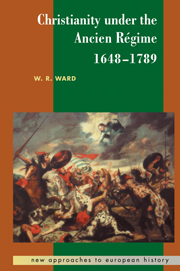Book contents
- Frontmatter
- Contents
- List of maps
- Preface
- Glossary
- 1 Peace and conflict: church and state in central and north-western Europe
- 2 Christianity in southern Europe
- 3 Catholicism in the Holy Roman Empire and the eastern Habsburg Lands
- 4 The religion of Protestants
- 5 Revival moves to the west
- 6 The Enlightenment and its precursors
- 7 The Churches in northern and eastern Europe
- 8 Religion after the Seven Years War
- Suggestions for further reading
- Index
- Title in the series
4 - The religion of Protestants
Published online by Cambridge University Press: 05 June 2012
- Frontmatter
- Contents
- List of maps
- Preface
- Glossary
- 1 Peace and conflict: church and state in central and north-western Europe
- 2 Christianity in southern Europe
- 3 Catholicism in the Holy Roman Empire and the eastern Habsburg Lands
- 4 The religion of Protestants
- 5 Revival moves to the west
- 6 The Enlightenment and its precursors
- 7 The Churches in northern and eastern Europe
- 8 Religion after the Seven Years War
- Suggestions for further reading
- Index
- Title in the series
Summary
The Bible only?
Macaulay's schoolboy would certainly have known that in a work of 1638, which enjoyed a heyday in the later seventeenth and early eighteenth centuries, Chillingworth had magisterially pronounced that ‘the Bible, I say, the Bible only, is the religion of Protestants’. As a statement of fact as distinct from an assertion about authority, this had never been true; and the seventeenth century was to explore the difficulties of embedding the Bible in cultural authorities of alien kinds, as the eighteenth began to explore the difficulties inherent in the Bible itself. This intellectual approach to the problems of Christianity as a working religion was as characteristic of the Protestant Orthodox as of the Catholics; there were other approaches which will concern us later in the chapter. In the second generation after the Reformation the Lutheran and Reformed Orthodox parties created a highly integrated systematic theology, guaranteed against Catholic polemic, and they expected that the backing of secular authority would root their formulations in popular religious life. But they had been unable to construct their systems or even expound the doctrine of the Trinity without liberal application to Aristotle. In 1697 Pierre Bayle barely exaggerated: ‘Aristotle, usually called the Prince of Philosophers, or the Philosopher par excellence, was the founder of a sect which has surpassed and finally engulfed all the rest.
- Type
- Chapter
- Information
- Christianity under the Ancien Régime, 1648–1789 , pp. 71 - 104Publisher: Cambridge University PressPrint publication year: 1999
- 2
- Cited by

